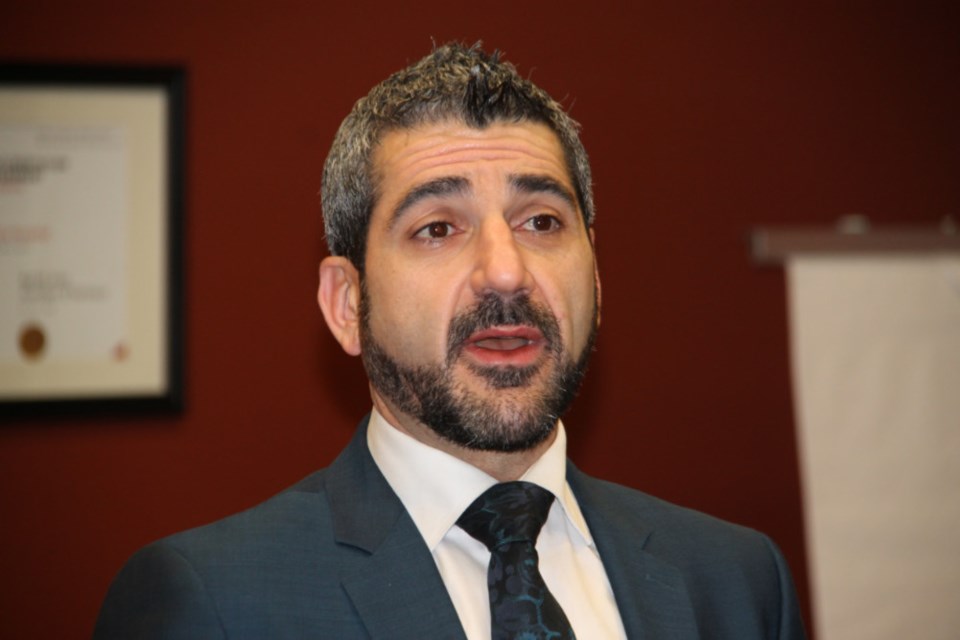Premier Doug Ford’s Progressive Conservative government has introduced its 2019 budget, aimed at eliminating Ontario’s deficit (which the Tories say is currently at $11.7 billion) by 2023-2024.
Saultites, along with the rest of the province’s residents, are concerned mainly with healthcare and education, the two biggest areas of concern to taxpayers within the government’s $163 billion budget.
A common topic of conversation has been government delisting of health care items such as sedation used in colonoscopy procedures.
“That is politicizing by the opposition and factually inaccurate,” said Sault MPP Ross Romano, speaking to SooToday in a telephone interview from Toronto after the budget was unveiled Thursday.
Romano said there is a working group in place, working with Ontario doctors, to remove “potentially medically unsafe procedures out of the system. That work is ongoing and no final decisions have been reached,” the Sault MPP suggesting the opposition NDP is fear mongering.
“I’m not an expert in healthcare, so I’m not going to pretend to know everything they’re looking at. At this time there’s nothing final (from the working group),” Romano said when asked to define an example of a “potentially medically unsafe procedure.”
On a clearer note, Romano commented on the budget’s $90 million program to provide free dental care for low income seniors (seniors with an annual income of less than $19,300, or senior couples with a combined annual income of less than $32,300), an item of interest for Sault Ste. Marie’s aging population.
“That was a measure we promised,” Romano said.
“There are far too many low income seniors who cannot get dental care, and now that care will be provided to them with this budget,” Romano said, adding the province is putting $384 million into hospital budgets, along with an additional $267 million into community and home care programs.
The province, however, ended prescription drug coverage for children and young people covered by a private insurance plan as of April 1.
On the topic of child care, Romano said the budget will give many people in various income brackets a break.
“Families earning less than $150,000 a year can get up to 75 per cent of their child care costs back, and they can use it however they wish to use it. We’re not forcing them to go to a specific daycare that’s open 9 to 5...if they want to hire a nanny or a babysitter for whatever hours (they can).”
In regard to education, school board administrators, teachers, teachers unions and students themselves have expressed, in recent days, fears over talk of nearly 3,500 teaching positions being cut across the province.
“No one is getting laid off,” Romano said, stating teachers unions and opposition parties are using those figures to fear monger after the government announced its plans to increase class sizes, primarily at the high school level.
“There are 3,700 teachers every single year who either retire or are no longer employed for whatever reason,” Romano said.
“The sad reality is, today in Ontario, half our Grade 6 students are failing math. We are increasing the budget in education with an investment of $1.4 billion additional dollars to improve education infrastructure.”
“The conditions of schools are going to be improved. We’re developing a parents bill of rights to allow parents to play a more active role in their children’s education, supporting Indigenous student success by investing in a revised First Nations/Metis/Inuit curriculum…(and) we’re going to put a particular emphasis on math, science, the skilled trades, coding and financial literacy,” Romano said.
The government is also introducing measures to loosen up regulations concerning booze, planning to introduce legislation that would allow municipalities to set their own rules for alcohol consumption in public places. The measures, if passed, would also move up the hour at which alcohol can be served at licensed establishments to 9 a.m.
“This is about expanding choice...and we believe the people of Ontario are capable of making responsible decisions,” Romano said.
“If a municipality does not feel their citizens are capable of that, they don’t have to move forward with it. City councils will be able to make that determination, but we want to provide that option.”
Romano also confirmed the province will be moving ahead with a new slogan for Ontario licence plates (‘A Place To Grow’) and a new trillium logo.
Romano said the PC government, upon forming a government in 2018, inherited a $15 billion deficit from the previous Liberal government, stating the new government has already reduced that figure to $11.7 billion, aiming to be at $10.3 billion by the end of this year’s budget period.
“We did not want, in any way, to compromise our healthcare and education systems. We want to make sure our kids and our grandkids have quality healthcare and education, publicly funded, for generations to come.”
“We were on a path to bankruptcy and we are now on a pathway to balance by protecting healthcare, education and the creation of jobs,” Romano said.
